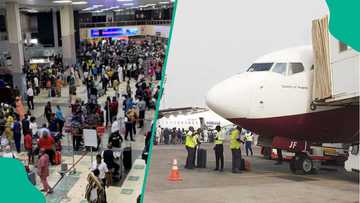Local Refiners Demand Regulation of Crude Oil Price, Lament Over Inadequate Supply
- Local petroleum refiners have lamented their difficulty in competing against importers of petroleum products and in getting feedstock from producers
- They sought the government’s protection through the creation of a crude oil pricing framework and the enforcement of the domestic crude supply obligation, provided by the PIA
- This call comes following the federal government’s reversal of the controversial 15% tariff on the importation of petroleum products
Oluwatobi Odeyinka is a business editor at Legit.ng, covering energy, the money market, tech and macroeconomic trends in Nigeria.
Local refiners under the aegis of the Crude Oil Refiners Association of Nigeria (CORAN) have lamented their difficulty in competing against importers of petroleum products, urging the government to create a crude oil pricing framework.
The association made the call in a statement signed by its publicity secretary, Eche Idoko, in which he reacted to the federal government’s reversal of the controversial 15% petrol import tariff.

Source: Getty Images
Idoko noted that the current system of “willing buyer, willing seller” has created price distortions that affect the competitiveness of local refiners, especially against importers.
The association called for a pricing framework that allows its members to compete and guarantees fair profit margins for crude oil producers.
The Petroleum Industry Act, 2021, makes provision for the Domestic Crude Supply Obligation (DCSO), in which upstream operators are given periodic quotas of supplies to domestic refineries, with the purpose of ensuring energy security.
However, the provision adds that this be done through a “willing buyer, willing seller” arrangement. That is, they negotiate on pricing on a free market basis.
CORAN has argued that the pricing arrangement is not favourable, urging the government to establish a pricing regime that protects local refiners.
Previous calls by the association for a structured pricing framework were rejected by the Nigeria Upstream Petroleum Regulatory Commission (NUPRC), which insisted that the willing buyer, willing seller arrangement is in line with global best practices, The Sun reported.

Read also
Nigerian airlines warn of higher fares after controversial NIS charge set to begin on December 1
The NUPRC Chief Executive, Engr. Gbenga Komolafe said the commission was committed to encouraging all stakeholders, and most importantly, improving Nigeria’s crude oil production, which is currently below its OPEC quota of 1.5 million barrels per day.
Local refineries struggle to get feedstocks
CORAN also lamented the challenge of getting feedstock locally, urging the government to ensure crude oil producers comply with the domestic crude supply obligation and also expand the Naira-for-Crude policy to all refineries.

Source: Getty Images
The Naira-for-Crude policy, in which crude oil producers are encouraged to sell crude oil to refineries in the local currency, is limited to refineries that produce Premium Motor Spirit (PMS), such as the Dangote Refinery.
“Domestic refineries continue to face challenges in securing sufficient feedstock. The Federal Government should ensure strict enforcement of the Domestic Crude Supply Obligation (DCSO) as contained in the Petroleum Industry Act (PIA), while expanding the Naira-for-Crude policy to include all operational refineries, not just those producing Premium Motor Spirit (PMS),” CORAN demanded.
Establish Refinery Infrastructure Development Fund
The association also called for the creation of a Refinery Infrastructure Development Fund (RIDF) to provide financial support to existing local refineries and investment in new refineries.
Idoko also urged the government to reduce the regulatory bottlenecks in the petroleum industry in order to attract more investments.
He said:
“Streamlining regulatory approvals and ensuring predictable policies will help attract both local and foreign investors. Consistent engagement between government and industry stakeholders is vital for building mutual trust and achieving the shared goal of energy self-sufficiency.”
He added that CORAN is committed to partnering with the government and all relevant agencies to improve Nigeria's petroleum refining sector for economic diversification, industrial development, and job creation.
FG suspends 15% import tariff on petrol
Legit.ng reported the federal government suspended the 15% import duty on petrol and diesel, about two weeks after the tariff was announced.
The imposition of a 15% tariff on the importation of PMS and diesel amidst a price war between the Dangote refinery and petrol importers generated controversy, with the latter warning of a hike in petrol price.
The government had earlier argued that the tariff was not imposed for the purpose of revenue generation, but to stabilise the downstream sector and help the country achieve fuel self-sufficiency.
Source: Legit.ng



